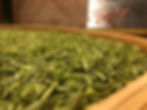Blog 162: The Development of Black Tea’s Aromas
- Valley Brook Tea
- Apr 8, 2020
- 3 min read
The aroma is a crucial quality criterion. This is why tea makers always say that “with aromas, a flower becomes alive; with aromas, a tea becomes regal”. (花因香而“活”,茶因香而“贵”)
As one of the most famous tea categories in the world, black tea has a wide range of noticeable aromas. Sometimes, it’s hard to believe that fresh leaves can develop so many complex aromas. Because black tea’s unique aroma profile, some of our customers have asked that if our black teas are flavored with ingredients.
The answer is NO. Of course, there are flavored black tea with additives and ingredients on the market. But when it comes to authentic and natural black tea, no product is flavored.
Today, we’ll explain how and why black tea can develop so many wonderful aromas.
Black tea’s complex aromas are the result of black tea’s tea-making process. More specifically, it’s the fermentation process that triggers the aroma development. During fermentation, enzymes and other substances in fresh leaves react with oxygen to form different kinds of aromas.
There’re over 700 kinds of fragrances in tea leaves. The tea-making process can activate various fragrances that have a floral, fruity, or honey profile.
Because black tea is fully fermented, it has a more sufficient fragrance transformation and development. As a result, black tea has a much higher fragrant substance content.
If we categorize black tea’s aromas based on their chemical structure, there are 4 major groups: fat derivatives, terpene derivatives, aromatic derivatives, and heterocyclic compounds containing nitrogen, oxygen, and sulfur.
Naturally, tea makers are not chemists, and tea-making is not about mixing chemicals. When it comes to tea-making, the aromas are decided by 3 categories: tea plant variety, territory, and tea-making techniques.
Variety
Different tea plants deliver fresh leaves with various fragrant substances, chemical compound ratios, and glucoside hydrolase content. These differences ultimately affect a black tea’s aromas.
Although a black tea’s the overall aroma profile can also be affected by other variables such as location and climate, the hereditary characters of a tea plant are still more dominant. For example, Shui Xian plants naturally carry an orchid aroma, and Rou Gui plants carry a cinnamon aroma.
Territory
Every tea field is unique. Fresh leaves from different tea fields would also absorb some “flavors” from their birthplace.
Tea fields can have positive or negative impacts on the quality of fresh leaves. These impacts can be the product of the overall sunlight condition, temperature, humidity, vegetation coverage, etc. The combination of all elements of a tea field cannot be duplicated. This is why some famous tea mountain fields have their own distinct taste and aroma features.
Tea-making Techniques
There are certain aromas, such as “honey aroma” and “potato aroma”, are developed by the tea-making process. The fragrant substances are intricately transformed during the tea-making. Normally, in fresh leaves, there are only less than 100 fragrant substances; however, after the tea-making, the number of fragrance compounds would increase to over 400 kinds.
The development and the transformation of black tea’s aromas are not caused by just one tea-making step or a few substances. Depending on the tea plant variety, tea plant growing condition, and the harvest condition, tea makers need to adjust the length the strength of all 11 tea-making steps to bring out the best taste and aroma of fresh leaves.
Finally, we’d like to discuss the aroma difference between natural aromas and artificially-flavored aromas.
Natural aromas are long-lasting. Even after multiple infusions, the aromas are still vivid and strong. Artificially-flavored aromas, however, are flirtatious and fleeting. Unnatural aromas usually disappear after the first infusion, and leave a rather “hollow” mouthfeel.
We hope you enjoyed today’s blog. As always, if you have questions or suggestions, please leave a comment, tweet us @valleybrooktea or email the author directly at zhang@valleybrooktea.com. Please also follow us on Instagram @valleybrooktea and join our mail list to get our daily tea updates and our latest promotions!
This is a Valley Brook Tea original blog. All rights reserved.





